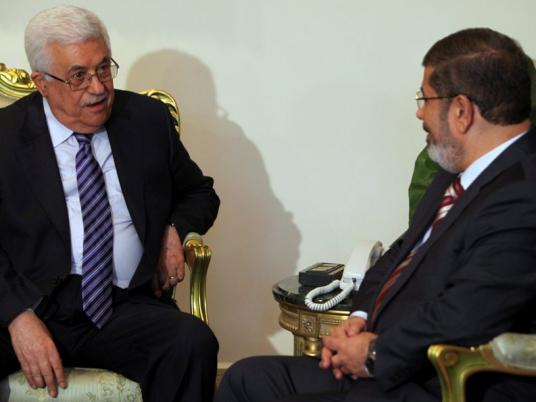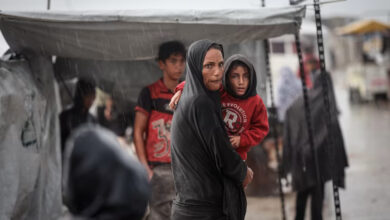
Separate meetings between President Mohamed Morsy and the leaders of Palestinian factions Hamas and Fatah in Cairo Wednesday yielded no signs of progress toward healing their five-year feud.
Palestinian and Egyptian officials said Morsy met President Mahmoud Abbas of the secular Fatah group and Khaled Meshaal of the Islamist Hamas movement to discuss how to implement a reconciliation deal that they agreed in Cairo in 2011.
Egyptian mediators had hoped to coax all three into the same room, and a Palestinian source told Reuters that Abbas and Meshaal would meet later in the evening, but without the Egyptian president.
Speaking after Morsy's meeting with Abbas, Egyptian presidential spokesperson, Yasser Ali, gave no indication of any major progress, but said Cairo would spare no effort to bring about reconciliation.
Hamas spokesperson Sami Abu Zuhri played down the talks in Cairo, describing them as "exploratory."
"Egyptian officials aim to explore where things stand and look into the best ways to activate reconciliation efforts," he told Reuters.
Abbas is reluctant to accept any format that would imply giving the Hamas leader a status equivalent to his own.
Morsy, mired in political and economic difficulties at home, helped broker a cease-fire deal that ended a war in November between Israel and Hamas, which controls the Gaza Strip.
Leaders of the two groups have been deadlocked over the how to implement the agreement and have traded blame over continued arrests among members in the West Bank, where Abbas holds sway, and in Gaza, which Hamas wrested from Abbas' control in 2007.
On Tuesday, a Hamas court sentenced a senior Fatah armed activist, Zaki al-Sakani, to 15 years in prison for possession of weapons, according to Hamas security sources. A Fatah official described the verdict as a blow to reconciliation.
Hani Habib, a political analyst in Gaza, said the Cairo talks, like previous meetings, had little chance of success.
"The talks today were meant to show something regarding reconciliation is happening but there will be nothing new," he said. "Each side has been unable to twist the other's arm and therefore each is happy with the status quo."
Thaw in relations
The Palestinian rivals have drawn closer since Israel's assault on Gaza in November, in which Hamas claimed victory, and a diplomatic win by Abbas the same month in which the United Nations voted to recognize Palestine as a "non-member state."
The Egyptian-drafted agreement called on both sides to form a unity government that would oversee an election and reform the Abbas-led Palestine Liberation Organization to include Hamas and the less influential Islamic Jihad group.
Abbas says Hamas is obstructing election registration in Gaza, while Meshaal says the pact needs to be implemented as a whole, with Hamas prisoners in West Bank jails released.
A senior Hamas official in Gaza accused Abbas of dragging his feet on reconciliation and slowing its pace because he was still hoping for a renewal of stalled peace talks with Israel.
"Our information showed that President Abbas would head towards reviving negotiations with the occupation [Israel] when the election in Israel is finished," Salah al-Bardaweel said in a statement.
Israel will hold a parliamentary election on 22 January.
It has criticized Palestinian unity efforts, fearing that grassroots support for Hamas, deemed a terrorist group by the Jewish state and Western governments, could overwhelm Abbas' administration, which has long renounced violence against Israel.




